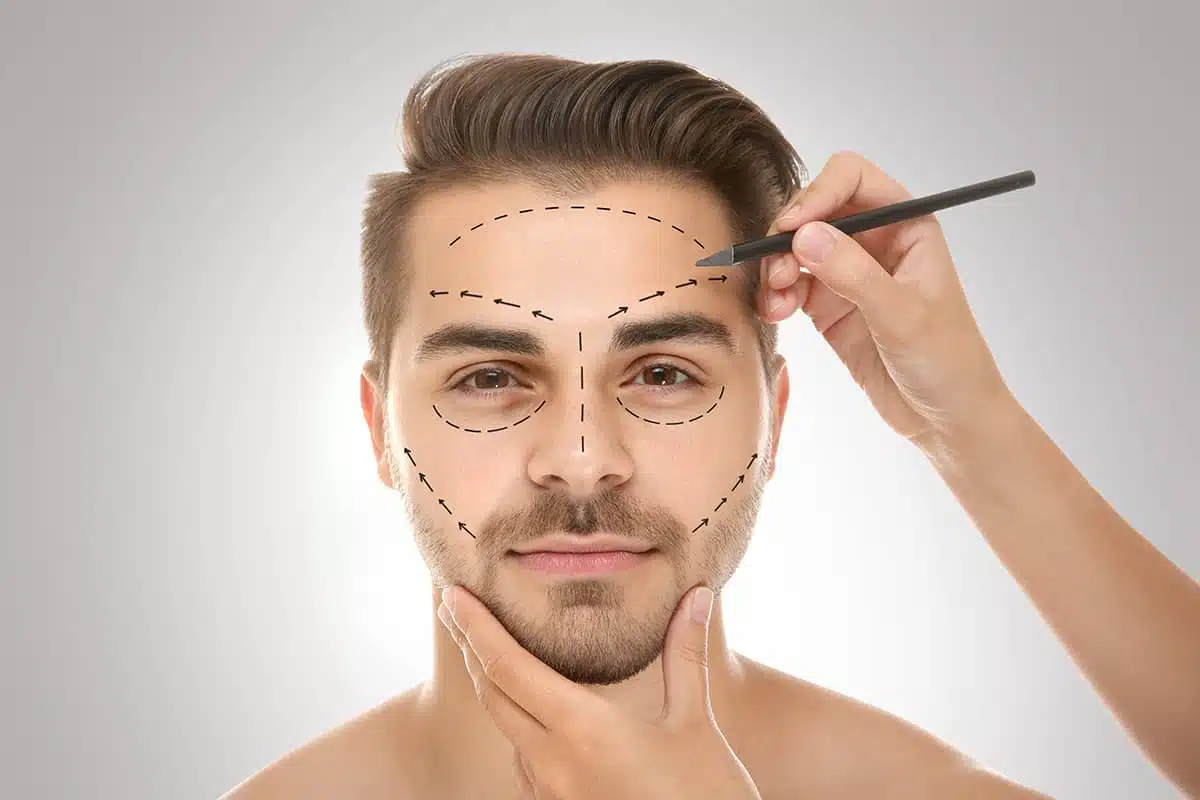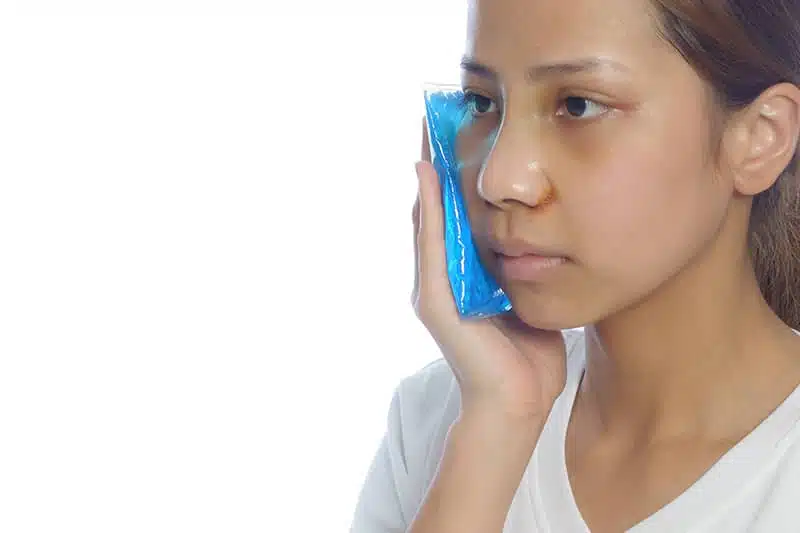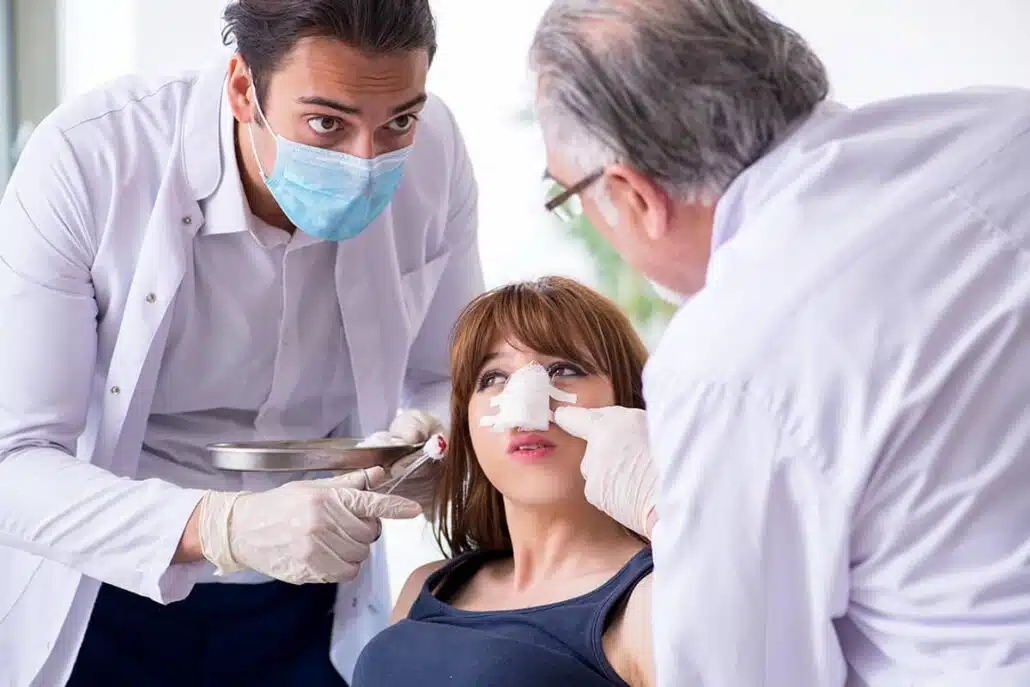Swelling After Plastic Surgery

Have you ever looked in the mirror after a procedure and wondered, “Is this normal?” Facial swelling after surgery can be unsettling, especially if you’re not sure what to expect. Understanding the healing process is key to staying calm and confident during recovery.
Facial plastic surgery can transform your appearance and boost your confidence, but it’s normal to experience some post-operative swelling. In fact, facial swelling after surgery is one of the most common parts of the healing journey. Read on to learn what causes it, how long it lasts, and how to ease your recovery.
What Causes Bruising and Swelling After Plastic Surgery?
Swelling and bruising are natural responses to any surgical procedure. During facial plastic surgery, small blood vessels are disrupted and tissues are manipulated. This causes fluid and blood to collect in the area, leading to bruising and post-surgical swelling. These symptoms are part of the body’s healing process and typically peak within the first few days post-operation. Factors such as the extent of the procedure, individual healing rates, and how well post-operative instructions are followed can all influence the severity and duration of swelling.
How Long Does Swelling Last After Plastic Surgery?
Swelling after facial surgery is a normal part of the healing process and can vary widely depending on the type of procedure performed. For more invasive operations like facelift surgery or rhinoplasty, it’s common for the most noticeable swelling to peak within the first 48 to 72 hours and then gradually subside. However, mild swelling may linger for several weeks after surgery.
Recovery times are different for everyone and are influenced by factors such as age, general health, and how closely post-operative instructions are followed. While most patients notice a substantial improvement in swelling within two to three weeks, subtle swelling can persist longer, especially in areas where skin is thinner or more delicate.

How to Reduce Swelling After Plastic Surgery
Managing inflammation effectively after surgery is a crucial part of a successful recovery process. Whether you’ve had a procedure on your face or nose, implementing proper care techniques can significantly improve your comfort and speed up the resolution of swelling. Below are some proven strategies to help you feel better and heal faster.
Get Plenty of Rest
Rest is essential to the body’s natural healing process. After surgery, your body requires additional energy to repair tissues and reduce swelling. Prioritizing sleep and minimizing physical and emotional stress can help you recover faster and more comfortably. Try to maintain a consistent sleep schedule and avoid overstimulation, especially in the first few days after your procedure.
Cold Compresses
Applying cold compresses during the first 48 hours after surgery is one of the most effective ways to minimize swelling. Cold therapy helps constrict blood vessels, reducing fluid buildup and inflammation in the affected area. For facial procedures, gently place the compress over the area without adding pressure. If your surgeon recommends it, using a compression garment alongside cold compresses can further support optimal healing and comfort.
Elevate the Surgical Area
Keeping your head elevated after facial surgery is a simple yet powerful way to minimize swelling. Head elevation helps reduce fluid accumulation by encouraging proper blood flow and lymphatic drainage. Use extra pillows or a wedge cushion while sleeping, and avoid lying flat whenever possible during the first week post-op. This position also supports a more comfortable and stable healing environment.
Avoid Strenuous Activity
Engaging in physical exertion too soon after surgery can increase blood flow and pressure in the treated areas, potentially worsening swelling and delaying the healing process. It’s important to avoid strenuous activity, heavy lifting, and intense exercise during the initial recovery phase. Even seemingly mild actions like bending over or lifting grocery bags can contribute to unnecessary strain. Always follow your surgeon’s recommendations about when it’s safe to resume regular physical activity.
Secure Your Safe Treatment Experience with Dr. Daniel G. Becker.
Join our satisfied clients who’ve experienced safe, effective treatments.
Supplements to Reduce Swelling After Plastic Surgery
In addition to rest, elevation, and cold therapy, certain medications and supplements may help reduce swelling and support your body’s healing process. While not a substitute for post-operative care, these additions can complement your recovery plan when used appropriately. Always consult your surgeon before starting any new regimen, as not all supplements are suitable for every patient or procedure.
Bromelain and Arnica
Bromelain, an enzyme found in pineapple, is known for its anti-inflammatory properties and is often recommended to help reduce swelling and bruising after surgery. Arnica, a natural herb, is another popular supplement used to manage inflammation and ease discomfort. When taken as directed and approved by your surgeon, both can be beneficial additions to your recovery routine. These natural remedies may be especially helpful in facial procedures where swelling is more visible and can aid in promoting a smoother, faster healing experience.
Other Supplements
In addition to bromelain and arnica, several other natural supplements have been linked to reduced inflammation and improved healing. Vitamin C plays a key role in collagen production and tissue repair, making it a helpful addition during recovery. Omega-3 fatty acids, commonly found in fish oil, offer anti-inflammatory benefits that may help minimize swelling. Grape seed extract is another option believed to support circulation and strengthen blood vessels, which can contribute to faster recovery and reduced bruising. As always, consult your doctor before adding any new supplement to your post-surgical routine.
Lymphatic Massage for Swelling After Plastic Surgery
Lymphatic massage is a gentle technique designed to stimulate the flow of lymph fluid, which can help reduce post-operative swelling and promote faster healing. When performed correctly, it encourages the body to eliminate excess fluid and waste more efficiently, easing pressure and puffiness around the surgical site.
Many patients find that incorporating lymphatic massage into their recovery routine helps them feel more comfortable and notice visible improvements in swelling sooner. However, it’s crucial to have this type of massage performed by a trained professional familiar with post-surgical care to ensure safety and effectiveness.
Other Recovery Tips After Cosmetic Surgery
Beyond managing swelling directly, there are several additional steps you can take to support an optimal healing process. Paying attention to your overall health and habits during recovery can make a noticeable difference in your comfort and the quality of your results. From lifestyle choices to nutrition, these tips can help ensure a smoother and more efficient recovery journey.
Avoid Smoking and Alcohol
Smoking and drinking alcohol during the recovery period can significantly impair your body’s ability to heal. Nicotine restricts blood flow, reducing the oxygen supply to tissues, while alcohol can interfere with medications and increase the risk of bleeding and bruising. Eliminating both from your routine, at least in the weeks immediately following surgery, helps lower the risk of complications and supports a smoother, more predictable recovery.
Diet for Better Healing
Your diet plays a key role in how efficiently your body heals after surgery. To reduce fluid retention and swelling, limit your intake of sodium. Staying well-hydrated by drinking plenty of water also helps flush out toxins and supports your recovery. You may also benefit from anti-inflammatory foods like pumpkin, seaweed, and black beans—especially those rich in vitamin A—which can promote healing and help protect against infection.
Follow Your Surgeon’s Post-Operative Care Instructions
One of the most important things you can do to ensure a smooth recovery is to follow your surgeon’s post-operative instructions precisely. These guidelines are tailored to your specific procedure and take into account your unique health needs. Whether it’s managing medications, applying cold compresses, or attending follow-up visits, sticking to the plan helps prevent complications and supports optimal healing.
Ignoring or modifying instructions on your own can lead to unnecessary setbacks or prolonged swelling. Clear communication with your surgical team and full adherence to their advice are essential for a safe and efficient recovery.

Consult with a Facial Plastic Surgeon Today
Choosing an experienced facial plastic surgeon can make all the difference in both your results and recovery experience. Proper technique, surgical precision, and a deep understanding of post-surgical healing help minimize complications like excessive swelling and bruising.
At The Becker Rhinoplasty Center, Dr. Daniel Becker leads with unmatched expertise. A Clinical Professor at the University of Pennsylvania and director of the PENN Rhinoplasty Course since 1998, Dr. Becker has authored over 100 scientific publications and four surgical textbooks. His reputation as a top-rated specialist ensures you’re in the best hands. Call us at 856-772-1617 or 856-589-6673 or visit our contact page to schedule your consultation today.